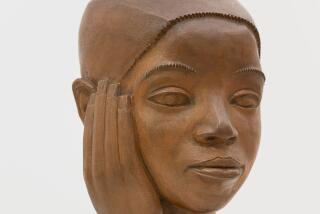‘Poster Father’ Weary of Sour Fate : Kentucky: Tom Fletcher still lives in the hillside house where Lyndon Johnson visited. He voices resentment over media interest in his life story, in which most luck has been bad.
- Share via
INEZ, Ky. — Tom Fletcher was already waging his own private battle with poverty when the President showed up on his front porch and drafted him into a “war.”
Lyndon B. Johnson chose the 38-year-old unemployed father of eight “to illustrate the human toll the declining mining industry had taken on these Appalachian families,” Lady Bird Johnson would write.
The images from Fletcher’s humble home in the rugged eastern Kentucky hills were an opening salvo in Johnson’s ambitious War on Poverty in 1964.
Thirty years later, the Martin County man still lives in the hillside house where Johnson squatted and chatted with him.
Then, Fletcher said he hoped Johnson’s visit “would bring us some luck.”
Now, in a rare interview, he voiced resentment of pursuit by reporters updating a life story in which most luck has been bad.
“I’m getting tired of it,” said Fletcher, now 68. “After all this time, I’d think they would be letting it go.”
“As long as the rest of the country insists on seeing poverty as symbols and stereotypes . . . people will always be fascinated with Tom Fletcher,” said Ron Eller, director of the University of Kentucky Appalachian Center. “For every Tom Fletcher, there were many, many thousands of others in the region who have been able to improve their quality of life and to struggle to improve their communities.”
Martin County remains site of one of the hardest struggles. The Appalachian Center estimates 35.4% of its population--three times the national average--lives in poverty and says unofficial unemployment rates have reached 57%.
The vagaries of dependence upon the coal industry took their toll, with 1,700 well-paying coal jobs, or more than half, lost since 1980 in Martin. Despite persistent economic woes, folks here generally agree that there has been progress--in housing, transportation, public health and education.
“I think all things come together,” said Phyllis Walker, director of the local office of the Big Sandy Community Action Council, an anti-poverty program. “We see successes all the time.”
Fletcher made good fodder in 1964 for the high-profile campaign Johnson wanted. Today, he makes good fodder for those who highlight its failures.
In 1963, Fletcher had earned just $400 from sporadic sawmill work. He had also worked in the mines and on the railroads.
He had paid $100 for his tiny, coal-heated house on Rockcastle Creek and got government help to install electricity.
To this day, Fletcher resents descriptions of his home as a tar-paper-covered shack. He insists the house--now covered in blue planking with white trim--had brick siding when Johnson visited.
There was an upswing for Fletcher.
By 1965, he was earning $42 a week while studying auto mechanics through the Manpower Development and Training Program. He also worked on a government-funded road crew, known locally as “happy pappy” gangs.
But he never got a mechanic’s job, and a broken leg in 1969 ended his last regular employment. He now lives on a $284 monthly disability check.
The anniversaries of Johnson’s war periodically bring reporters and curiosity-seekers to Fletcher’s home, and personal tragedy in 1992 thrust him again into the glare of publicity.
He and his second wife, Mary Porter Fletcher, were charged with murder in the poisoning death of their 3-year-old daughter, Ella Rose, and the attempted murder of 4-year-old Tommy Jr.
Ella died that January of what doctors diagnosed as a seizure disorder.
But her brother was hospitalized the next month, and examinations revealed he had ingested massive amounts of Darvon, a pain-killer. His sister’s body was exhumed, and an autopsy showed an overdose of Elavil, an antidepressant.
Mary Fletcher later confessed to poisoning the children in hopes of ending marital strife, and of collecting $5,000 insurance policies. She cleared her husband and is serving a 25-year prison sentence for murder and first-degree criminal abuse.
Ironically, a Johnson program may have saved Tommy Jr.’s life three decades later. Teachers in the Head Start program here first called attention to his symptoms.
Tommy Jr., riding his bicycle one recent day in the Fletchers’ yard, was friendly. The blond boy said his father was visiting relatives in Cincinnati, and he provided the telephone number.
Fletcher, weak from stomach and heart ailments, was reluctant.
“I’ve said enough on it,” he said in a low, gravelly voice.
Asked why he was unable to break out of poverty, Fletcher replied slowly: “I don’t know.”
But he added that he doesn’t regret welcoming Johnson onto his porch.
“President Johnson was a good President,” he said. “He was nice. He done a good favor to a lot of people.”
More to Read
Sign up for Essential California
The most important California stories and recommendations in your inbox every morning.
You may occasionally receive promotional content from the Los Angeles Times.













